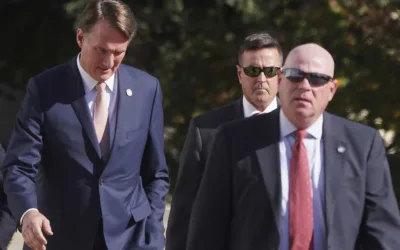Rep. Elaine Luria (D-Va.) wants the U.S. to become the world leader in developing and producing future technologies to solve the climate crisis, and this weekend she introduced a plan that aims to make that happen. The announcement comes two weeks after another Virginia Democrat, Congressman Donald McEachin, said he will introduce legislation to put the country on a path to a 100% clean economy by 2050 — one of the key objectives of the Climate Change Task Force’s policy principles.
Together, Luria and McEachin bring two southern voices to the climate change negotiating table. In recent years, the loudest voices on climate change have come from the coasts, especially Northeastern liberal strongholds. The usual suspects include Vermont Sen. Bernie Sanders (I), Massachusetts Sens. Elizabeth Warren (D) and Ed Markey (D), and Rhode Island Sen. Sheldon Whitehouse (D). In the past year you can add to that list the social media-savvy, progressive freshman Rep. Alexandria Ocasio-Cortez (D-N.Y.).
But the lack of congressional leadership on climate issues from Midwestern and Southern states could help explain why these regions are less informed and less concerned about global warming.
Luria and McEachin’s emergence as leaders on the issue add diversity to the group of climate problem-solvers in Congress, which could help push the conversation outside of the far-left bubble where it often resides.
Luria leads the New Democrat Coalition Climate Change Task Force, along with three other House Democrats. On Sunday, that group released what it calls an “ambitious pro-climate and pro-market agenda” that outlines new principles for a U.S. climate policy. It’s an 11-page plan that proposes several different methods to create a “clean planet and economy,” like increased public investment in research and development of green technologies.
Luria is a centrist Democrat who ousted a Republican incumbent to join Congress in 2018. The retired Navy commander represents Virginia Beach and parts of Hampton Roads. Rather than speaking in environmentalist hyperbole, she talks about climate change as an economic and national security issue with direct and immediate impacts on her district.
McEachin joined the House of Representatives in 2017, where he quickly established himself as a leading voice on climate by launching a bipartisan environmental justice task force and introducing a constitutional amendment that would codify people’s right to clean air, pure water, and preserving the natural environment.
Far from your typical environmentalist, the economic-justice focused McEachin hardly mentioned the environment until the last few years, as he began to draw connections between issues of the environment and issues of social equity, public health, and economic empowerment.
The duo could also help draw more attention to Virginia’s unique stake in mitigating the climate crisis.
“For coastal Virginians, sea level rise, recurrent flooding, and extreme weather aren’t concerns for the future; they are problems we deal with every day,” Luria said in a statement.
Virginia Beach, for example, is the second-most at-risk region in the United States to coastal sea-level rise, just behind New Orleans. Rising water levels are already contributing to increased flooding in the region, which adversely affects infrastructure, impairs local businesses’ ability to keep their doors open, and deters future development. By 2050, climate change is expected to cause another 1.5 to 2 feet of sea-level rise in the region, further disrupting the local economy.
Other byproducts of global warming including erosion and changing ocean currents increase the vulnerability of military infrastructure, a fact not lost on Luria, who serves on the House Armed Services Committee. At least six Virginia military bases, including the world’s largest Navy base in Norfolk, are threatened by climate change — the third-most of any state, according to a 2019 Department of Defense report, which stated global warming is a national security concern.
For many Virginians, those alarm bells and other worries like increased drought and more days of extreme heat per year, are more than good enough reasons to prioritize the development of climate change solutions.
But for others, such as low-income people struggling to pay for healthcare and feed their families, climate change can feel like a less immediate concern.
“We have to start telling Americans, and this includes people of color and African Americans, what’s in it for them,” McEachin said in an interview. “And what can be in it for them is more, better-paying jobs.”

Here’s everything you need to know about this month’s Mercury retrograde
Does everything in your life feel a little more chaotic than usual? Or do you feel like misunderstandings are cropping up more frequently than they...

VIDEO: Check out Dogwood’s new merch line
Big news, Virginia! We've officially launched our Dogwood merch line 🎉 This year, we celebrate 5 years of bringing you Virginia news you can use....

VIDEO: Your support matters!
Your support matters! Donate today. @vadogwoodnews Your support matters! Visit our link in bio to donate today. #virginianews #virginia #community...

Op-Ed: Virginia’s new Democratic majorities pass key bills to improve your lives, but will Youngkin sign them?
The 2024 Virginia General Assembly regular session has wrapped up. It was a peculiar session from the outset, with Democratic majorities in the...

From the state rock to the state flower, here’s how Virginia got its symbols
Have you ever wondered why the Dogwood is the state flower? Or how the cardinal became the state bird? We’re here to answer those questions and more...

VIDEO: Second-gentleman Douglas Emhoff gives speech on reproductive freedom
Second gentleman, Douglas Emhoff touched on reproductive freedom not only being a woman's issue but "an everyone's issue" during the Biden-Harris...




